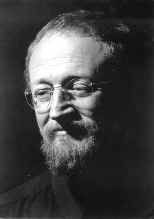 Regarding the Memorial to the Murdered Jews of Europe,
Regarding the Memorial to the Murdered Jews of Europe,
which opens today in Berlin: “I too was struck by Ourousoff’s article in the Times,” Bill Osborne
messages. “It was far above what one usually reads in the paper, but one of the statements you quoted yesterday really
bothered me:
The memorial’s power lies in its willingness to grapple with the moral
ambiguities arising in the Holocaust’s shadow. Its focus is on the delicate, almost imperceptible
line that separates good and evil, life and death, guilt and innocence.
“Just how ‘imperceptible’ were the lines that separated good and evil during Germany’s
persecution of the Jews?” Osborne, above, asks. “Why did the world think it could just overlook
the Nuremberg Laws? By 1935, the
extreme violence and degradation directed toward the Jews was mind-boggling, and openly
practiced for the whole world to see. The actions were obviously evil. The lines that were
crossed were not in any way ‘imperceptible.’
This is important to note, because if the abuses caused by the Nuremberg Laws had been stopped
(and this was well before Germany had re-armed,) the Holocaust would never have happened. It
would have also put Hitler out of power. How ironic if Berlin’s new monument rationalizes the
world’s willful, numbed blindness.
“But there are important meanings symbolized by the memorial. Once you enter the spiritual
labyrinth of the Holocaust, it is difficult to ever fully return. Your perceptions of humanity are too
deeply altered. As the memorial symbolizes, you enter at first not knowing quite what you are
seeing. You still have an ability to maintain an outside perspective. But as you go deeper and
deeper all reference is lost. There is an abyss in our humanity that has never been defined, and
which no religion, philosophy or moral system has ever adequately examined. The Holocaust thus
remains without any frame of reference from which it can be approached. The impulses that
created the Holocaust are very human, but come from a hideous part of the social psyche of
which we have almost no knowledge or understanding. It is a labyrinth in which we become lost
because it has never been mapped. Among many other things, the memorial is a monument to our
lack of knowledge about who and what we really are.
“But that does not mean we do not know evil when we see it. Decent people do not stand by
when humans are subjected to beatings, arson, humiliation, radical degradation and systematic
disappropriation. Through the Nuremberg Laws, the entire world watched this happen with full
knowledge that the actions were evil.
“And little has changed.”
As usual, Osborne’s perceptions and conscience are far more acute than mine.
